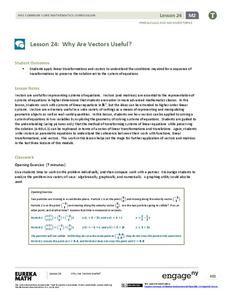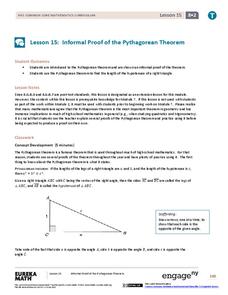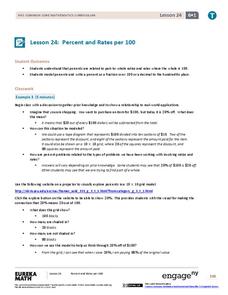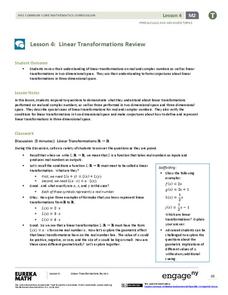EngageNY
Overcoming a Third Obstacle to Factoring— What If There Are No Real Number Solutions?
Time for pupils to use their imagination! Learners examine the relationship between a system with no real solution and its graph. They then verify their discoveries with algebra.
EngageNY
Recursive Formulas for Sequences
Provide Algebra I learners with a logical approach to making connections between the types of sequences and formulas with a instructional activity that uses what class members know about explicit formulas to develop an...
EngageNY
Properties of Logarithms
Log the resource on logarithms for future use. Learners review and explore properties of logarithms and solve base 10 exponential equations in the 12th installment of a 35-part module. An emphasis on theoretical definitions and...
EngageNY
Matrix Multiplication and Addition
To commute or not to commute, that is the question. The 26th segment in a 32-segment lesson focuses on the effect of performing one transformation after another one. The pupils develop the procedure in order to multiply two 2 X 2...
EngageNY
Getting a Handle on New Transformations 2
Use 2x2 matrices to move along a line. The second day of a two-day lesson is the 28th installment in a 32-part unit. Pupils work together to create and solve systems of equations that will map a transformation to a given...
EngageNY
Why Are Vectors Useful? 2
Investigate the application of vector transformations applied to linear systems. Individuals use vectors to transform a linear system translating the solution to the origin. They apply their understanding of vectors, matrices,...
EngageNY
Designing Your Own Game
Your classes become video game designers for a day! They utilize their matrices, vectors, and transformation skills to create and design their own game images. The complex task requires learners to apply multiple concepts to create their...
EngageNY
Informal Proof of the Pythagorean Theorem
Prove the Pythagorean Theorem using multiple informal proofs. Scholars first develop an understanding of the origins of the Pythagorean Theorem through proofs. They round out the lesson by using the theorem to find missing side lengths...
EngageNY
Percent and Rates per 100
What percentage of your class understands percents? Pupils learn the meaning of percents based upon rates per 100 in the 24th lesson plan in a series of 29. They represent percents as fractions, decimals, ratios, and models. The scholars...
EngageNY
From Ratios to Rates
Rate ratios with unit rates and rate units. Pupils take ratios and determine their associated rates and unit rates. The scholars identify the different aspects of rates, the unit rate, and the rate unit. The instructional activity is the...
Kenan Fellows
Reading Airline Maintenance Graphs
Airline mechanics must be precise, or the consequences could be deadly. Their target ranges alter with changes in temperature and pressure. When preparing an airplane for flight, you must read a maintenance graph. The second lesson of...
EngageNY
Perimeter and Area of Polygonal Regions in the Cartesian Plane
How many sides does that polygon have? Building directly from lesson number eight in this series, learners now find the area and perimeter of any polygon on the coordinate plane. They decompose the polygons into triangles and use Green's...
EngageNY
Solution Sets to Simultaneous Equations (part 1)
How are systems related? Build on your pupils' previous knowledge of solving systems of equations by introducing systems of inequalities. Learners explore similarities between systems of equations and inequalities to make a strong...
EngageNY
Distance and Complex Numbers 2
Classmates apply midpoint concepts by leapfrogging around the complex plane. The 12th lesson in a 32 segment unit, asks pupils to apply distances and midpoints in relationship to two complex numbers. The class develops a formula to find...
EngageNY
Equations Involving a Variable Expression in the Denominator
0/0 doesn't equal 0! Begin this instructional activity by allowing the class to explore the concept of dividing by zero. The introduction allows for discovery and provides meaningful examples of dividing by zero. This understanding leads...
EngageNY
Getting a Handle on New Transformations 1
In the first of a two-day lesson on transformations with matrix notation the class transforms the unit square using general transformations, then calculates the area of the transformed image. They discover it is the same as finding...
West Contra Costa Unified School District
Matching Quadratic Functions
Ever sigh when learners ask why they have to know so many different forms of the quadratic equation? Here is a lesson that comes in handy! Using hands-on matching activities, quadratic equations are explored through...
West Contra Costa Unified School District
Using Bar Models to Solve Rate Problems
Pupils visualize distance-rate-time problems by using bar models. The lesson presents examples of four different types of rate problems and shows how they can be solved using bar models and equations. Each example is followed...
EngageNY
Linear Transformations Review
Time for matrices and complex numbers to come together. Individuals use matrices to add and multiply complex numbers by a scalar. The instructional activity makes a strong connection between the operations and graphical transformations.
Perkins School for the Blind
Circle Time
Oftentimes children or teens with one or more disability are reluctant to participate in whole-group activities. Foster good participation, verbal expression, and social skills through daily circle time activities. Each day you and...
Mathematics Assessment Project
Generalizing Patterns: Table Tiles
As part of a study of geometric patterns, scholars complete an assessment task determining the number of tiles needed to cover a tabletop. They then evaluate provided sample responses to see different ways to solve the same...
West Contra Costa Unified School District
Shifting Linear Equations in Function Notation
Time for a shift in thinking! Learners examine translations of linear functions. They use function notation to describe the translation and make connections to the graph.
Curated OER
The Effect of Math Anxiety on Cardiovascular Homeostasis
Using a pulse monitor, learners will measure a resting pulse, take a math test, and then measure the pulse again. They analyze the change in pulse and compare it to performance on the test. This multi-purpose lesson can be used in a...
Virginia Department of Education
Practical Problems Involving Decimals
After discussing decimals and "going shopping" in the classroom, young mathematicians are given four practical word problems that require them to estimate their answers, given specific information. The highlight of the lesson is...
Other popular searches
- Time Zone Lesson Maths
- Math Lessons Time Duration
- Time Math Lesson Plans
- Math Lessons Time
- Maths Time Lesson
- Christmas Math Lesson on Time
- Math Lessons on Time
- Maths Time Lesson Plans
- Math Lessons Telling Time

























